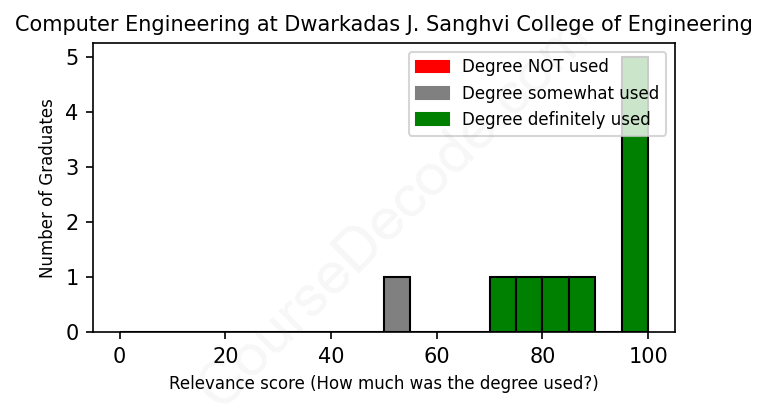
First, some facts. Of the Computer Engineering graduates from Dwarkadas J. Sanghvi College of Engineering we've analyzed , here's how many have used (or NOT used) their degree in their career:

These are estimates based on AI analysis of 10 LinkedIn profiles (see below).
The verdict? Significantly above average. Overall, with an average relevance score of 85%, Computer Engineering graduates from Dwarkadas J. Sanghvi College of Engineering have a much higher likelihood (+18%) of finding work in this field compared to the average graduate across all fields:
And for comparison, here's the chart for all profiles we've looked at across all degrees.
Also, after graduating, 90% of these graduates have pursued further education other than another Bachelor's degree (such as a Masters degree or other), compared to the average across all profiles of 35%. This suggests you may need more than just a Bachelors degree to be competitive as a Computer Engineering graduate.
See the details:
|
Relevance score: 71% We think this person has gone into a career highly relevant to their degree. We think this person has gone into a career highly relevant to their degree.
DEGREE INFOGraduated in 2022 from Dwarkadas J. Sanghvi College of Engineering with a Bachelor of Engineering - BE in Computer Engineering. Also pursued further education since (see below). JOB HISTORY SINCE GRADUATIONFirmware Engineer ANEUVO Jun 2023 - Aug 2023 Student Lead for Baltimore Robotics Mentoring  Centre for Educational Outreach, Johns Hopkins University Aug 2023 - Jan 2024 Student Lead for WISE Program  Center for Educational Outreach, Johns Hopkins University Jan 2024 - Present Research Assistant  Haptics and Medical Robotics (HAMR) Laboratory, Johns Hopkins University Jan 2024 - Present FURTHER DEGREES DONE SINCE GRADUATINGMastersThe Johns Hopkins University 2022 - 2024 ABOUTAs a second-year master's student in robotics at JHU, my research is primarily focused on Software Development for an Upper-Limb Prosthesis System with the Haptics and Medical Robotics (HAMR) lab. All of my current experience lies in the domain of Software Development, Embedded Systems, Firmware Engineering, Robotics, IoT and Automations, and outreach for students who wish to pursue STEM academically or as a competition base.My previous professional experience includes taking up a role as a Firmware Engineering Intern at Aneuvo, a Medical Devices Start-up based out in Los Angeles, California. With them, I assisted in decreasing latency of data transfer, sensor integration and increasing power efficiency of the system using embedded technology. Previous work from India in community outreach has worked into my background wherein I was a mentor for students taking part in VEX IQ Competition in the Baltimore City Public Schools Division. I now assist the STEM outreach office for an internship based research cohort program for high school students at JHU. Having done coursework in Project and Product Management, and leading the Robotics Team at DJSCE as the vice captain, I have a strong technical and managerial background in computer science, electronics, computer vision, machine learning, IoT, robotics and embedded engineering. I always believe that you not only need to better yourself, but should also engage in helping younger people who want to tread on a similar path as you. |
The top 10 most common jobs done by the graduates we've analyzed (ranked most common to least) are:
From analyzing LinkedIn profiles of graduates from Dwarkadas J. Sanghvi College of Engineering, it's clear that a significant number of individuals have landed jobs with a strong focus on software engineering. Many graduates have taken up roles like Software Engineer, Software Development Engineer, or Application Developer, especially at well-known companies like Amazon, LinkedIn, and Morgan Stanley. These positions typically require a solid foundation in programming, algorithms, and system design—all of which are core topics in Computer Engineering. It’s pretty encouraging to see that many have secured roles that effectively utilize the technical knowledge they gained during their studies, which aligns perfectly with their degrees.
However, not all job experiences are entirely relevant to Computer Engineering. A few graduates have ventured into roles like Product Manager or positions primarily focused on communication or leadership, which, while valuable in the job market, don't fully capitalize on the technical skills acquired during their education. Overall, while many of the jobs are closely related to Computer Engineering, indicating a successful application of their education, others suggest that not every graduate is directly using their technical skills regularly. This serves as a reminder that versatile educational backgrounds can lead to varied career paths, some more aligned with the degree than others.
Here is a visual representation of the most common words in job titles for Computer Engineering graduates (this is across all Computer Engineering graduates we've analyzed, not just those who went to Dwarkadas J. Sanghvi College of Engineering):

It looks like graduates from Dwarkadas J. Sanghvi College of Engineering have tended to kick off strong careers in the tech field, especially right after graduating. Many of them land their first jobs as software engineers, application developers, or in various analyses and managerial roles in reputable companies like Morgan Stanley, Amazon, and J.P. Morgan. Over the years, they seem to move up the ladder quickly, taking on more responsibilities and roles like software development engineers and product managers. There are also some interesting entrepreneurship and passion projects among them, showing a mix of creativity and technical prowess.
Fast forward five to ten years, and many of these alumni have progressed into senior positions or specialized roles, such as senior software engineers or product managers, often still within tech giants or startups. They're involved in cutting-edge projects like machine learning, product development, and various engineering roles, which indicates they’re not just sticking to entry-level jobs. Overall, it’s pretty safe to say that most of these graduates are carving out successful careers relevant to their field, with a good rate of advancement and development in their careers. So, if you're considering a degree in Computer Engineering, you'll likely have a solid foundation for a thriving career!
Getting a Bachelor’s degree in Computer Engineering can be pretty challenging, and that goes for Dwarkadas J. Sanghvi College of Engineering too. You’ll be juggling a mix of tough subjects like programming, circuits, and systems, which can get overwhelming at times, especially with all the projects and lab work involved. The workload can feel intense, and you really need to be dedicated and stay on top of your studies. That said, if you have a genuine interest in technology and a knack for problem-solving, you might find it more manageable and even enjoyable. So, in short, it’s definitely on the harder side compared to some other degrees, but with the right mindset, you can totally handle it!
Most commonly, in the LinkedIn profiles we've looked at, it takes people 4 years to finish a Bachelor degree in Computer Engineering.
Looking at the career paths of these Computer Engineering graduates from Dwarkadas J. Sanghvi College of Engineering, it seems like they’ve generally landed on pretty decent-paying jobs, especially the ones who got into big-name companies like Amazon and Morgan Stanley. The first grad, for example, moved up the ladder from an associate role to a principal associate, which usually means a nice salary bump along the way. Others have taken on manager and senior roles at reputable firms, indicating they’re likely earning well into the mid to high range for salaries. Even those in more recent positions, like software engineers at LinkedIn and AWS, are typically in the upper salary brackets for the tech industry. So yeah, it looks like they’re doing well financially!
Here is a visual representation of the most common words seen in the "about" section of LinkedIn profiles who have a Bachelor degree in Computer Engineering (this is across all Computer Engineering graduates we've analyzed, not just those who went to Dwarkadas J. Sanghvi College of Engineering). This may or may not be useful:

Here are all colleges offering a Bachelor degree in Computer Engineering (ordered by the average relevance score of their Computer Engineering graduates, best to worst) where we have analyzed at least 10 of their graduates:
| College | Score | Count |
|---|---|---|
 University of Florida University of Florida
|
95 | 18 |
 Michigan State University Michigan State University
|
94 | 10 |
 Brigham Young University Brigham Young University
|
94 | 10 |
 Penn State University Penn State University
|
92 | 14 |
 California Polytechnic State University-San Luis Obispo California Polytechnic State University-San Luis Obispo
|
91 | 14 |
 University of Central Florida University of Central Florida
|
90 | 14 |
 Georgia Institute of Technology Georgia Institute of Technology
|
90 | 14 |
 Purdue University Purdue University
|
86 | 34 |
 University of Illinois at Urbana-Champaign University of Illinois at Urbana-Champaign
|
86 | 30 |
 Iowa State University Iowa State University
|
86 | 25 |
 Texas A&M University Texas A&M University
|
85 | 17 |
 San Jose State University San Jose State University
|
85 | 16 |
 Clemson University Clemson University
|
85 | 14 |
 Dwarkadas J. Sanghvi College of Engineering Dwarkadas J. Sanghvi College of Engineering
|
85 | 10 |
 North Dakota State University North Dakota State University
|
84 | 12 |
 Savitribai Phule Pune University Savitribai Phule Pune University
|
83 | 25 |
 University of Mumbai University of Mumbai
|
82 | 43 |
 New Jersey Institute of Technology New Jersey Institute of Technology
|
81 | 11 |
 University of North Carolina at Charlotte University of North Carolina at Charlotte
|
79 | 11 |
 California State Polytechnic University-Pomona California State Polytechnic University-Pomona
|
76 | 11 |
 The University of Texas at Dallas The University of Texas at Dallas
|
76 | 18 |
 University of South Florida University of South Florida
|
69 | 10 |
 Gujarat Technological University, Ahmedbabd Gujarat Technological University, Ahmedbabd
|
55 | 13 |